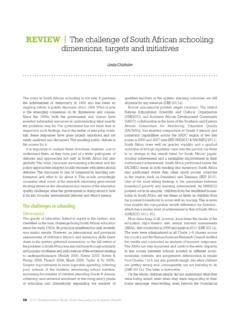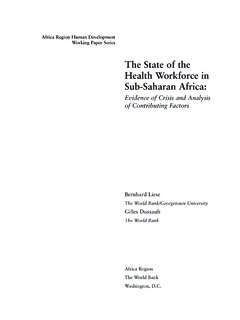Transcription of South African HIGHER EDUCATION REVIEWED
1 South African HIGHER EDUCATION REVIEWED : Two decades of democracyHIGHER EDUCATIONREVIEWEDTwo Decades Of DemocracySouth AfricanThe Book of Expects_chosen 13/18/2016 12:17:19 PMThe CHE is an independent statutory body established by the HIGHER EDUCATION Act, no. 101 of 1997. The CHE is the Quality Council for HIGHER EDUCATION , advises the Minister of HIGHER EDUCATION and Training on all HIGHER EDUCATION issues and is responsible for quality assurance and promotion through the HIGHER EDUCATION Quality by the Council on HIGHER EDUCATION (CHE) in 20161 Quintin Brand StreetPersequor TechnoparkBrummeriaPretoriaSouth Africa+27 12 349 Council on HIGHER EDUCATION , Pretoria, 2016 All rights reserved.
2 Material from this publication may not be reproduced without the CHE s : 978-0-9946785-4-3 South African highereducation REVIEWED :Two decades of democracyEight task team reportsForeword A word from the CEOA cronyms1 Overview Task team members: Colin Bundy, Jon File & Mala SinghWriters and editors: Denyse Webbstock with Glen Fisher52 Regulation Task team leader: Felicity CoughlanMembers/contributors: Trish Gibbon, Brenda Leibowitz, Luke Mlilo & Martin OosthuizenWriters and editors: Yunus Ballim with Ian Scott, Genevieve Simpson & Denyse WebbstockCHE research assistant: Michael Gordon633 Governance Task team leader: Jairam ReddyMembers/contributors: Bennie Anderson, Magda Fourie-Malherbe, Tembile Kulati, Thami Ledwaba & Anthony StaakWriters and editors: Lis Lange & Thierry Luescher-MamashelaCHE research assistant.
3 Ntokozo Bhengu1054 Teaching and Learning Task team leader: Matete MadibaMembers/contributors: Gerry Bokana, Vivienne Bozalek, Siyabulela Sabata, Ian Scott & Yusef WaghidWriters and editors: Sioux McKenna CHE research assistant: Precious Sipuka143 Contents5 Research Task team leader: Prins NevhutaluMembers/contributors: Rishidaw Balkaran, Robin Crewe, Pamela Dube, Andrew Kaniki, Steve Madue & Susan VeldsmanWriters and editors: Genevieve Simpson with Wieland Gevers1936 Community engagement Task team leader: Brian O ConnellMembers/contributors.
4 Samuel Fongwa, Glenda Kruss, Sonwabo Ngcelwane, Jerome Slamat & Jayshree ThakrarWriters and editors: Judy Favish with Genevieve SimpsonCHE research assistant: Neo Ramoupi2417 Academic Staffing Task team leader: John HigginsMembers/contributors: Raphael de Kadt, Thandi Lewin, Sean Muller & Chris WinbergWriters and editors: Denyse Webbstock with Chika Sehoole CHE research assistant: Mosa Phadi2798 Funding Task team leader: Jenny GlennieMembers/contributors: Glen Barnes, Gerald Ouma & Charles SheppardWriters and editors: Charles Simkins with Ian Scott, Rolf Stumpf & Denyse WebbstockCHE research assistant: Michael Gordon & Genevieve Simpson321 Two decades ago, South Africa entered a new era of democracy.
5 The initial euphoria has been tempered by the hard work that followed in transforming and rebuilding the major social institutions of the country to address the vast challenges of inequality, poverty and the need for economic growth. HIGHER EDUCATION remains, as it was then, central to the projects of modernisation, transformation and renewal in the country, just as it too is subject to those same forces. In that propitious year of 1994, Beck wrote that, the more societies are modernised, the more agents acquire the ability to reflect on the social conditions of their existence and to change them in that way.
6 1 What he was pointing to is the importance in a democracy of developing the ability to reflect on and analyse policy, and to influence the interventions that are designed to bring about a healthy and productive society. Not only is HIGHER EDUCATION important in and of itself, but it is a barometer of societal content or discontent, as academics and students are perhaps the freest agents in democratic societies to think, reflect and act. It is apposite at this juncture, therefore, to take stock of HIGHER EDUCATION in South Africa; to reflect on its achievements, its shortcomings, its contradictions and its various roles and purposes, and to apply the wisdom of hindsight, such that we may look forward more clearly to a re-imagined future.
7 The contributors to this volume share a commitment and a passion for HIGHER EDUCATION . They have reflected and analysed the HIGHER EDUCATION sector from different vantage points, and brought their collective wisdom to bear on the intractable problems that beset the sector, as well as pointed out the milestones reached in the long journey towards a more equitable sector that draws on the full range of human capacities for knowing, teaching and learning , and that forges stronger links between knowing the world and living creatively in it, in solitude and community.
8 2 Their insights and detailed analyses of data, documents and events serve to enrich our understanding of HIGHER EDUCATION , and provide a solid basis from which the CHE can draw in formulating future policy-impelling advice. It is also hoped that this volume will generate further discussion and research among academics and officials working in the HIGHER EDUCATION sphere, and that a broader readership will find it a useful overview of the developments in HIGHER EDUCATION since 1994. Professor Themba MosiaChair of CouncilForeword1 U.
9 Beck (1994) The reinvention of politics: towards a theory of reflexive modernisation in U. Beck, A. Giddens & S. Lash, Reflexive modernisation: Politics, tradition and aesthetics in the modern social order, Polity Press, Oxford. 2 P. Palmer & A Zajonc (2010) The heart of HIGHER EDUCATION : A call to renewal, Jossey-Bass, San EDUCATION in South Africa in the post-apartheid era has never been more volatile than it is currently, some two decades into democracy, yet it is, contradictorily, perhaps the part of the entire EDUCATION sector that has advanced most in terms of achieving national goals of quality, equity and transformation.
10 There is much that HIGHER EDUCATION can claim to have achieved: integration as a system from its fragmented past; an established quality assurance and advisory body; a single dedicated national department; a fundamentally altered institutional landscape; greater access and a radical change in the demography of its students, with an 80% growth in the number of African students; HIGHER research output and international recognition through large research projects, more attention paid to teaching and learning, to curriculum and to student support; the implementation of a governing framework for its educational offerings; the allocation of financial aid to many more students than twenty years ago; and having nationally coordinated projects and grants to address some of the identified areas for improvement.













